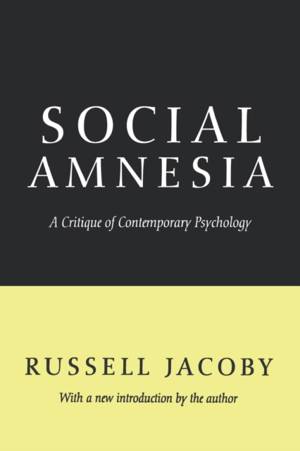
- Afhalen na 1 uur in een winkel met voorraad
- Gratis thuislevering in België vanaf € 30
- Ruim aanbod met 7 miljoen producten
- Afhalen na 1 uur in een winkel met voorraad
- Gratis thuislevering in België vanaf € 30
- Ruim aanbod met 7 miljoen producten
Zoeken
€ 94,95
+ 189 punten
Uitvoering
Omschrijving
Russell Jacoby defines social amnesia as society's repression of remembrance - society's own past. In this book, Jacoby excavates the critical and historical concepts that have fallen prey to the dynamic of a society that strips them both of their historical and critical content. Social Amnesia is an effort to remember what is perpetually lost under the pressure of society. It is simultaneously a critique of present practices and theories in psychology. Jacoby's new self-evaluation has the same sharp edge as the book itself, offering special insights into the evolution of psychological theory during the past two decades.In his probing, self-critical new introduction, Jacoby maintains that any serious appraisal of psychology or sociology, or any discipline, must seek to separate the political from the theoretical. He discusses how in the years since Social Amnesia was first published society has oscillated from extreme subjectivism to extreme objectivism, which feed off each other and constitute two forms of social amnesia: a forgetting of the past and a pseudo-historical consciousness. Social Amnesia contains a forceful argument for "thinking against the grain - an endeavor that remains as urgent as ever." It is an important work for sociologists, psychologists, and psychoanalysts.
Specificaties
Betrokkenen
- Auteur(s):
- Uitgeverij:
Inhoud
- Aantal bladzijden:
- 224
- Taal:
- Engels
Eigenschappen
- Productcode (EAN):
- 9781560008927
- Verschijningsdatum:
- 30/06/1996
- Uitvoering:
- Paperback
- Formaat:
- Trade paperback (VS)
- Afmetingen:
- 152 mm x 229 mm
- Gewicht:
- 303 g

Alleen bij Standaard Boekhandel
+ 189 punten op je klantenkaart van Standaard Boekhandel
Beoordelingen
We publiceren alleen reviews die voldoen aan de voorwaarden voor reviews. Bekijk onze voorwaarden voor reviews.











